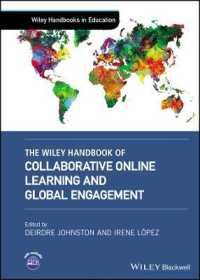- ホーム
- > 洋書
- > 英文書
- > Science / Mathematics
Full Description
Artificial Intelligence for Computational Fluid Dynamics offers a groundbreaking exploration of how high-performance computing and artificial intelligence (AI) revolutionize computational fluid dynamics (CFD). Designed for students and researchers alike, this book consolidates information on machine learning, deep learning, and neural networking, demonstrating their transformative potential in CFD. With an emphasis on both the current state of the field and future possibilities, the text serves as a vital resource for anyone looking to understand and leverage AI in fluid dynamics. This work not only educates but also inspires innovation within a rapidly evolving scientific landscape.
The book delves into future research directions, aligning with the newly amended CFD vision for 2030, and underscores the importance of continued development. It introduces scientific tools and software integral to AI-driven CFD applications, ensuring that readers gain practical knowledge alongside theoretical insights. Authored by renowned experts with extensive teaching and research experience, this work stands at the intersection of cutting-edge technology and academic rigor, making it an indispensable reference for anyone in the field.
Contents
1. Artificial Intelligence and Computational Fluid Dynamics: Background
2. Introduction to artificial intelligence and subsets
3. Artificial intelligence based computational fluid dynamics approaches
4. Enhanced reduced order modeling and accelerated direct numerical simulation
5. Machine learning/ Deep Learning architectures and Computational Fluid Dynamics
6. Turbulence Closure Modeling using Deep Learning
7. DNNs - CNNs/RNNs/PINNs/cPINNs/xPINNs
8. ANN as popular AI tool for CFD
9. Support Vector Machine (SVM) an important Supervised Learning Category
10. Current AI algorithms in CFD and implementation
11. AI for accelerated CFD and fluid flow optimization
12. Dynamic Model Decomposition of complex Fluid Flow Analysis using Machine Learning
13. Machine learning based optimal mesh generation and optimization
14. Machine learning based New sparse algorithms
15. Commercial and open source models/codes used in industry for AI and CFD
16. Modern tools, languages and systems available for implementing AI algorithms.
17. Aerodynamic Modeling in CFD using AI
18. Application of AI for Turbulence Modeling
19. Application of AI in CFD for Boundary layer and Multiphase Flows
20. AI in Heat and Mass Transfer using CFD
21. AI for CFD in materials industry and other applications
22. Operating challenges for AI in CFD and the available solutions
23. AI, CFD and CFD Vision 2030
23. Conclusion Remarks






